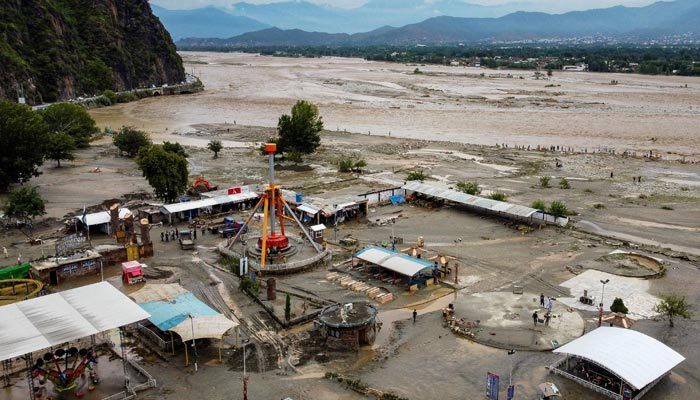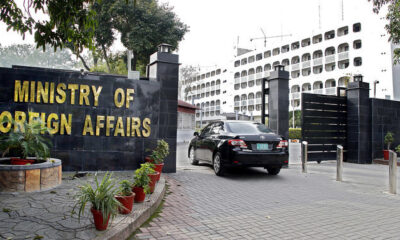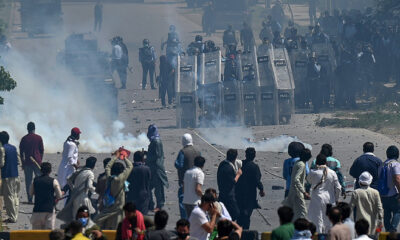- Many rivers in Khyber Pakhtunkhwa have burst their banks, demolishing scores of buildings.
- “The house which we built with years of hard work started sinking in front of our eyes,” says Junaid Khan.
- Officials say this year’s monsoon flooding has affected more than 33 million people.
MINGORA, PAKISTAN: Thousands of people living near flood-swollen rivers in Pakistan’s north were ordered to evacuate Saturday as the death toll from devastating monsoon rains neared 1,000 with no end in sight.
Many rivers in Khyber Pakhtunkhwa — a picturesque province of rugged mountains and valleys — have burst their banks, demolishing scores of buildings including a 150-room hotel that crumbled into a raging torrent.
“The house which we built with years of hard work started sinking in front of our eyes,” said Junaid Khan, 23, the owner of two fish farms in Chrasadda.
“We sat on the side of the road and watched our dream house sinking.”
The annual monsoon is essential for irrigating crops and replenishing lakes and dams across the Indian subcontinent, but each year it also brings a wave of destruction.
Officials say this year’s monsoon flooding has affected more than 33 million people — one in seven Pakistanis — destroying or badly damaging nearly a million homes.
On Saturday, authorities ordered thousands of residents in threatened areas to evacuate their homes as rivers had still not reached maximum capacity.
“Initially some people refused to leave, but when the water level increased they agreed,” Bilal Faizi, spokesman for the Rescue 1122 emergency service, told AFP.
Officials say this year’s floods are comparable to 2010 — the worst on record — when over 2,000 people died and nearly a fifth of the country was under water.
Farmer Shah Faisal, camped by the side of a road in Chrasadda with his wife and two daughters, described how he saw his riverside home swallowed by a river as the powerful current eroded the bank.
The Jindi, Swat and Kabul rivers flow through the town before joining the mighty Indus, which is also flooding downstream.
“We escaped with our lives,” Faisal told AFP.
Climate change
Officials blame the devastation on man-made climate change, saying Pakistan is unfairly bearing the consequences of irresponsible environmental practices elsewhere in the world.
Pakistan is eighth on the Global Climate Risk Index, a list compiled by the environmental NGO Germanwatch of countries deemed most vulnerable to extreme weather caused by climate change.
Still, local authorities must shoulder some of the blame for the devastation.
Corruption, poor planning and the flouting of local regulations mean thousands of buildings have been erected in areas prone to seasonal flooding — albeit not as bad as this year.
The government has declared an emergency and mobilised the military to deal with what Climate Change Minister Sherry Rehman on Wednesday called “a catastrophe of epic scale”.
According to the National Disaster Management Authority, since the monsoon started in June more than two million acres of cultivated crops have been wiped out, 3,100 kilometres (1,900 miles) of roads have been destroyed and 149 bridges have been washed away.
In Sukkur, more than 1,000 kilometres south of Swat, farmlands irrigated by the Indus were under water, and tens of thousands of people were seeking shelter on elevated roads and highways as they waited for fresh torrents from the north.
“We have opened the gates fully,” dam supervisor Aziz Soomro told AFP, adding the main rush of water was expected Sunday.
The flooding could not come at a worse time for Pakistan, whose economy is in free fall and whose politics are gripped by crisis following the ousting of former prime minister Imran Khan by a parliamentary vote of no confidence in April.


 Latest News2 days ago
Latest News2 days ago
 Business2 days ago
Business2 days ago
 Business1 day ago
Business1 day ago
 Business1 day ago
Business1 day ago
 Latest News2 days ago
Latest News2 days ago
 Business2 days ago
Business2 days ago
 Latest News2 days ago
Latest News2 days ago
 Latest News2 days ago
Latest News2 days ago





















